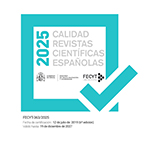Problemática de género de mujeres académicas en instituciones de investigación masculinizadas. Estudio de caso.
Resumen
Introducción. Diversos obstáculos son enfrentados por mujeres académicas de educación superior, ante culturas y prácticas que afectan su productividad y bienestar. Objetivo. Se pretende analizar la problemática de género y violencia que viven mujeres académicas en instituciones de educación superior masculinizadas, en particular la presencia de mobbing y la revictimización ante protocolos de actuación insuficientes. Metodología. Se empleó un enfoque cualitativo etnográfico de investigación, con el uso de narrativas y entrevistas semiestructuradas, observación del clima institucional y la revisión de procedimientos dirigidos a la prevención y atención a la violencia de género, como estudio de caso. La interpretación de los datos fue a través de teoría fundamentada con enfoque constructivista. Resultados y discusión. A pesar de la existencia de normatividades y compromisos gubernamentales sobre la prevención y atención a la violencia en diferentes ámbitos, en las instituciones de educación superior y de posgrado, esta se continúa ejerciendo sin considerar los efectos adversos que viven las académicas, en su salud física y emocional y aún en su productividad. El acoso laboral entre iguales, también llamado mobbing es muy frecuente y es poco atendido a pesar de la formalización de denuncias al respecto, los mecanismos no son suficientes ni adecuados para su sanción y prevención además de la ineficiente operacionalización de éstos por no contar con personal calificado para ello y resistencias para llevarlo a cabo. La protesta organizada de mujeres a través de diferentes medios se ha hecho visible. Conclusiones. Son necesarias actuaciones que trastoquen privilegios e ideologías patriarcales que conducen a la reproducción de la violencia de género en sus diferentes manifestaciones en los espacios académicos. El mobbing puede ser sofisticado y disimulado, ocurre en lugares de trabajo donde se privilegia la racionalidad, de ahí que se hace necesaria la generación de conocimiento sobre el tema para su visibilización, sanción y prevención.
Descargas
Descarga artículo
Licencia
La revista Investigaciones Feministas, para fomentar el intercambio global del conocimiento, facilita el acceso sin restricciones a sus contenidos desde el momento de su publicación en la presente edición electrónica, y por eso es una revista de acceso abierto. Los originales publicados en esta revista son propiedad de la Universidad Complutense de Madrid y es obligatorio citar su procedencia en cualquier reproducción total o parcial. Todos los contenidos se distribuyen bajo una licencia de uso y distribución Creative Commons Reconocimiento 4.0 (CC BY 4.0). Esta circunstancia ha de hacerse constar expresamente de esta forma cuando sea necesario. Puede consultar la versión informativa y el texto legal de la licencia.











